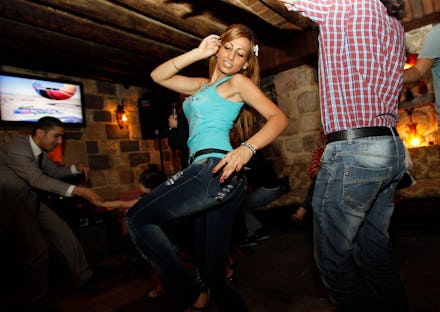Eyes Wide Shut: A vibrant party scene in Damascus despite bombs and surging death tolls

Instagram photos from around the city show people dressing up, dancing and celebrating. Couples are going to weddings. Friends are visiting hip new bars.
This isn't Paris, Berlin or New York, but Damascus, in the middle of war-torn Syria. While the rest of the country is being bombed and children are dying every day, a privileged class of Syrians is determined to keep the party going.
In an Instagram post from around a year ago, Milad Hannoun, 35, a make-up artist from Damascus, showed a scene from a fun night out with a glamorous group of friends.
"I thought Syria is full with war? I am confused," one commenter wrote.
"Just proves u shouldn't believe everything u see in your news," Hannoun replied.
The civil war in Syria has now been going on for more than five years, with an estimated death toll reaching up to 450,000; among them are 50,000 children.
It's a death toll the UN has stopped tracking due to the inaccessibility of many areas and the complications of contradictory statistics provided by the Syrian government and armed opposition groups. Most civilians are victims of the Bashar al-Assad regime, which has killed far more people in Syria than the Islamic State, and has used such brutal means as barrel bombs and chemical weapons. Russian airstrikes supporting the Syrian government have repeatedly targeted hospitals and led to even more casualties in rebel-held Aleppo.
In the capitol city, things are more stable. While millions of people have left the country, nearly two million Syrians — many of them regime supporters — have moved to relatively-safe Damascus. Hannoun calls them the "Nouveau Riches" — and they are his best customers.
"When the crisis began in 2011, I had hardly any work," Hannoun told der Spiegel. "People were afraid and didn't organize any events. It took three years until it became better."
Last year was Hannoun's most successful to date. He became famous within the beauty scene, getting job offers in Dubai and London — but he would never leave Syria, he said.
Business is also booming for Damascus photographer Raja Mamosh, 29, who started photographing weddings in 2014. Due to the value decrease of the Syrian pound, holding a wedding in Syria is cheaper than ever.
Up to 90% of his customers are traveling from abroad — from places like Dubai, Germany, Canada and Sweden — to wed in Damascus, he told der Spiegel. He photographs the couples' lavish nuptials in the historic old city or gardens of luxury hotels.
The Instagram diary of radio anchor Saiid Khoury, 23, offers another glimpse into the life of a privileged class of young people complying with the Assad regime in Damascus. He documents his days on Instagram, showing how he goes to work or to the gym, or has fun at the pool. His selfies have hashtags like "#sun, #swimming, #summer, #smile, #radio, #poolparty and #model."
He told der Spiegel that many new restaurants and bars opened after the ceasefire in Damascus, especially in the party quarter called Bab Scharki.
"Maximum ten-percent of the population can afford this lifestyle," Khoury said. "You can see a lot of ostentation in this city, people are driving the latest BMW models. Eighty-five percent of the people in bars would use an iPhone 6s."
Extravagance in Damascus is perhaps best embodied by the country's first family, whose palace is located in the capitol city. Assad's wife, Basma al-Assad, is famous for her luxurious lifestyle. A recent Facebook post suggested their children are learning languages and practicing their hobbies, according to Al Jazeera.
The Assad regime has inflicted countless atrocities upon the people of Syria. But for the city's wealthy set, the first lady is something of an idol. In an Instagram post on her birthday, Hannoun called her his "soulmate." The post received 859 likes from his more than 50,000 followers. "She's beautiful from inside and outside," wrote one commenter.
Damascus' privileged class knows what's happening in Syria — they've just developed a sense of indifference. If you go out partying in Damascus, you can expect to see children selling tissues in the same streets, sleeping on the ground and eating from the garbage, according to Khoury.
That lack of compassion can be observed in war zones and conflict regions worldwide, according to Israeli sociologist Eva Illouz.
"War brutalizes people, they see atrocities and they are forced to [make] decisions they would never have to make under normal circumstances," she said in a phone call. "This sharpens the will of survival, and the will of survival is opposite to compassion, to the ability to feel and enter into the suffering of another human being."
Khoury chooses not to show the sad side of Syria on social media, even though he sees it every day. "These scenes don't have their place on Instagram," he said.
"It wouldn't change anything, anyway."